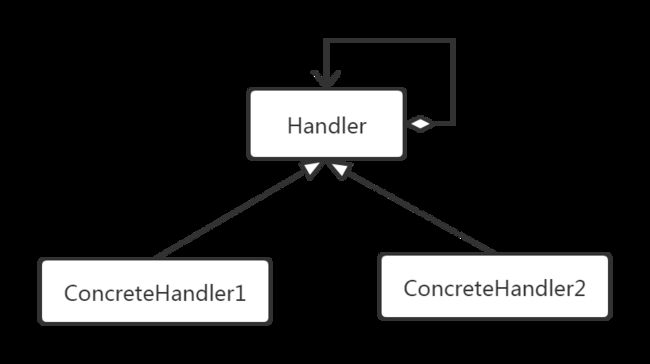Mybatis源码解析之模块解析:插件模块
介绍
我之前有篇文章大概写了一下mybatis插件的实现原理
Mybatis只写了接口,为什么能运行?
Mybaits插件的实现主要用了责任链模式和动态代理
动态代理可以对SQL语句执行过程中的某一点进行拦截,当配置多个插件时,责任链模式可以进行多次拦截,责任链模式的UML图如下

可以看到在一条责任链中,每个Handler对象都包含对下一个Handler对象的引用,一个Handler对象处理完消息会把请求传给下一个Handler对象继续处理,以此类推,直至整条责任链结束。这时我们可以改变Handler的执行顺序,增加或者删除Handler,符合开闭原则
写一个Mybatis插件
mybatis可以拦截如下方法的调用
- Executor(update,query,flushStatements,commit,rollback,getTransaction,close,isClosed)
- ParameterHandler(getParameterObject,setParameters)
- ResultSetHandler(handleResultSets,handleOutputParameters)
- StatementHandler(prepare,parameterize,batch,update,query)
至于为什么是这些对象,后面会提到
写一个打印SQL执行时间的插件
@Intercepts({@Signature(type = StatementHandler.class, method = "query", args = { Statement.class, ResultHandler.class }),
@Signature(type = StatementHandler.class, method = "update", args = { Statement.class }),
@Signature(type = StatementHandler.class, method = "batch", args = { Statement.class })})
public class SqlCostTimeInterceptor implements Interceptor {
public static final Logger logger = LoggerFactory.getLogger(SqlCostTimeInterceptor.class);
public Object intercept(Invocation invocation) throws Throwable {
StatementHandler statementHandler = (StatementHandler) invocation.getTarget();
long start = System.currentTimeMillis();
try {
// 执行被拦截的方法
return invocation.proceed();
} finally {
BoundSql boundSql = statementHandler.getBoundSql();
String sql = boundSql.getSql();
long end = System.currentTimeMillis();
long cost = end - start;
logger.info("{}, cost is {}", sql, cost);
}
}
public Object plugin(Object target) {
return Plugin.wrap(target, this);
}
public void setProperties(Properties properties) {
}
}
在mybatis配置文件中配置插件
<plugins>
<plugin interceptor="com.javashitang.part1.plugins.SqlCostTimeInterceptor"></plugin>
</plugins>
此时就可以打印出执行的SQL和耗费的时间,效果如下
select id, role_name as roleName, note from role where id = ?, cost is 35
原理分析
前面说过Mybatis是通过动态代理的方式来额外增加功能的,因此调用目标对象的方法后走的是代理对象的方法而不是原方法
说到这你可以能意识到拦截器只需要实现InvocationHandler接口就行了,先对指定对象生成一个代理类,然后在InvocationHandler的invoke方法中对指定方法进行增强。
但继承InvocationHandler后,生成代理类,并对指定方法进行增强这不是个累活么,框架完全可以再帮你封装一下啊
于是就有了@Intercepts注解,里面主要放多个@Signature注解,而@Signature注解则定义了要拦截的类和方法、
并且提供了Interceptor接口和Plugin类方便你实现动态代理,来看看他们怎么配合使用的吧
我们先从Interceptor接口来分析,因为要插件必须要实现Interceptor接口
public interface Interceptor {
/** 执行拦截逻辑的方法,Invocation只是将动态代理中获取到的一些参数封装成一个对象 */
Object intercept(Invocation invocation) throws Throwable;
/**
* target是被拦截的对象,它的作用是给被拦截对象生成一个代理对象,并返回它。
* 为了方便,可以直接使用Mybatis中org.apache.ibatis.plugin.Plugin类的wrap方法(是静态方法)生成代理对象
*/
Object plugin(Object target);
/** 根据配置初始化Interceptor对象 */
void setProperties(Properties properties);
}
其中plugin方法就是生成代理对象的,一般的做法是直接调用Plugin.wrap(target, this);方法来生成代理对象,到Plugin类里面看看,主要的方法如下
public class Plugin implements InvocationHandler {
/** 目标对象 */
private final Object target;
/** Interceptor对象 */
private final Interceptor interceptor;
/** 记录了@Signature注解中的信息 */
/** 被拦截的type->被拦截的方法 */
private final Map<Class<?>, Set<Method>> signatureMap;
private Plugin(Object target, Interceptor interceptor, Map<Class<?>, Set<Method>> signatureMap) {
this.target = target;
this.interceptor = interceptor;
this.signatureMap = signatureMap;
}
public static Object wrap(Object target, Interceptor interceptor) {
// 拿到拦截器要拦截的类及其方法
Map<Class<?>, Set<Method>> signatureMap = getSignatureMap(interceptor);
// 取得要改变行为的类 (ParameterHandler | ResultSetHandler | StatementHandler | Executor)
Class<?> type = target.getClass();
// 拿到被代理对象的拦截方法,所实现的接口
Class<?>[] interfaces = getAllInterfaces(type, signatureMap);
// 如果当前传入的Target的接口中有@Intercepts注解中定义的接口,那么为之生成代理,否则原Target返回
if (interfaces.length > 0) {
return Proxy.newProxyInstance(
type.getClassLoader(),
interfaces,
new Plugin(target, interceptor, signatureMap));
}
return target;
}
@Override
public Object invoke(Object proxy, Method method, Object[] args) throws Throwable {
try {
// 获取当前方法所在类或接口中,可被当前 Interceptor 拦截的方法
Set<Method> methods = signatureMap.get(method.getDeclaringClass());
// 如果当前调用的方法需要被拦截,则调用interceptor.intercept()方法进行拦截处理
if (methods != null && methods.contains(method)) {
return interceptor.intercept(new Invocation(target, method, args));
}
// 如果当前调用的方法不能被拦截,则调用target对象的相应方法
return method.invoke(target, args);
} catch (Exception e) {
throw ExceptionUtil.unwrapThrowable(e);
}
}
}
到现在为止,实现代理类和拦截特定方法用一个Plugin.wrap()方法就搞定了,贼方便。
在Plugin.invoke()方法中,最终调用了Interceptor接口的intercept方法,并把目标类,目标方法,参数封装成一个Invocation对象
return interceptor.intercept(new Invocation(target, method, args));
接着看Invocation的定义
/**
* @author Clinton Begin
* 将要调用的类,方法,参数封装成一个对象,方便传递给拦截器
*/
public class Invocation {
private final Object target;
private final Method method;
private final Object[] args;
public Invocation(Object target, Method method, Object[] args) {
this.target = target;
this.method = method;
this.args = args;
}
public Object getTarget() {
return target;
}
public Method getMethod() {
return method;
}
public Object[] getArgs() {
return args;
}
/** 这个方法是给拦截器调用的,拦截器最后会调用这个方法来执行本来要执行的方法,这样就可以在方法前后加上拦截的逻辑了 */
public Object proceed() throws InvocationTargetException, IllegalAccessException {
return method.invoke(target, args);
}
}
只有一个方法proceed()方法,而proceed()只是执行被拦截的方法,这时清楚了应该在Interceptor对象的intercept方法中做哪些操作了,只需要写增强的逻辑,最后调用Invocation对象的proceed()方法即可
至此我们已经大概理解了插件的工作原理,只差最后一步了,给目标对象生成代理对象,我们从Mybatis初始化找答案
在配置文件中配置插件的格式如下,interceptor填全类名,下面可以写多个key和value值,实现了Interceptor接口后,会有一个setProperties方法,会把这些属性值封装成一个Properties对象,设置进来
<plugin interceptor="">
<property name="" value=""/>
<property name="" value=""/>
</plugin>
mybatis配置文件的解析在XMLConfigBuilder的parseConfiguration方法中,这里我们只看一下插件的解析过程
pluginElement(root.evalNode("plugins"));
private void pluginElement(XNode parent) throws Exception {
if (parent != null) {
for (XNode child : parent.getChildren()) {
String interceptor = child.getStringAttribute("interceptor");
// 解析拦截器中配置的属性,并封装成一个Properties对象
Properties properties = child.getChildrenAsProperties();
// 通过类名示例化一个Interceptor对象
Interceptor interceptorInstance = (Interceptor) resolveClass(interceptor).newInstance();
// 可以给拦截器的Properties属性赋值
interceptorInstance.setProperties(properties);
configuration.addInterceptor(interceptorInstance);
}
}
}
实例化好的Interceptor对象,会被放到InterceptorChain对象的interceptors属性中
public class InterceptorChain {
private final List<Interceptor> interceptors = new ArrayList<Interceptor>();
/** 这里有个特别有意思的地方,先添加的拦截器最后才会执行,因为代理是一层一层套上去的,就像这个函数f(f(f(x))) */
public Object pluginAll(Object target) {
for (Interceptor interceptor : interceptors) {
target = interceptor.plugin(target);
}
return target;
}
public void addInterceptor(Interceptor interceptor) {
interceptors.add(interceptor);
}
public List<Interceptor> getInterceptors() {
return Collections.unmodifiableList(interceptors);
}
}
InterceptorChain对象的pluginAll方法不就是用来生成代理对象的吗?看看在哪调用了
parameterHandler = (ParameterHandler) interceptorChain.pluginAll(parameterHandler);
resultSetHandler = (ResultSetHandler) interceptorChain.pluginAll(resultSetHandler);
statementHandler = (StatementHandler) interceptorChain.pluginAll(statementHandler);
executor = (Executor) interceptorChain.pluginAll(executor);
这不就是前面提到的mybatis只能拦截特定类的原因吗?因为只对这些类做了代理。
至此Mybatis插件的原理就分析完了,还是挺简单的,但是要写一个实用的Mybatis插件并不容易,因为你要明白ParameterHandler等类的方法做了哪些事情,应该如何进行增强
最后总结一下,@Signature注解主要用来定义要拦截的类及其方法,而Interceptor接口和Plugin来配合为指定对象生成代理对象,并拦截指定方法,这样就能在其前后做一些额外操作
欢迎关注
参考博客
mybatis插件编写
[1]https://www.cnblogs.com/xrq730/p/6972268.html
mybatis插件实现原理
[2]https://www.cnblogs.com/xrq730/p/6984982.html
[3]https://juejin.im/post/5abe12f5f265da237411177f

